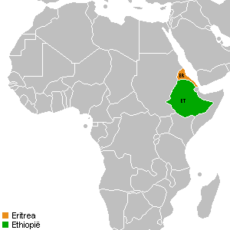United Nations Security Council Resolution 1741, adopted unanimously on January 30, 2007, after reaffirming all resolutions on the situation between Eritrea and Ethiopia, particularly resolutions 1320 (2000), 1430 (2003), 1466 (2003), 1640 (2005), 1681 (2006) and 1710 (2006), the Council extended the mandate of the United Nations Mission in Ethiopia and Eritrea (UNMEE) for a period of six months until July 31, 2007.

United Nations Security Council resolution 1320, adopted unanimously on 15 September 2000, after reaffirming resolutions 1298 (1999), 1308 (2000) and 1312 (2000) on the situation between Eritrea and Ethiopia, and 1308 (2000), the Council deployed a military component as part of the United Nations Mission in Ethiopia and Eritrea (UNMEE) and extended its mandate until 15 March 2001.

United Nations Security Council resolution 1344, adopted unanimously on 15 March 2001, after reaffirming resolutions 1298 (1999), 1308 (2000), 1312 (2000) and 1320 (2000) on the situation between Eritrea and Ethiopia, and 1308 (2000), the Council extended the mandate of the United Nations Mission in Ethiopia and Eritrea (UNMEE) until 15 September 2001.

United Nations Security Council resolution 1369, adopted unanimously on 14 September 2001, after reaffirming resolutions 1298 (1999), 1308 (2000), 1312 (2000), 1320 (2000) and 1344 (2001) on the situation between Eritrea and Ethiopia, the Council extended the mandate of the United Nations Mission in Ethiopia and Eritrea (UNMEE) until 15 March 2002.

United Nations Security Council resolution 1430, adopted unanimously on 14 August 2002, after reaffirming Resolution 1398 (2002) on the situation between Eritrea and Ethiopia, the Council adjusted the mandate of the United Nations Mission in Ethiopia and Eritrea (UNMEE) to assist in the implementation of the decision of the Eritrea-Ethiopia Boundary Commission.

United Nations Security Council resolution 1434, adopted unanimously on 6 September 2002, after reaffirming all resolutions on the situation between Eritrea and Ethiopia, particularly Resolution 1430 (2002), the council extended the mandate of the United Nations Mission in Ethiopia and Eritrea (UNMEE) until 15 March 2003.

United Nations Security Council resolution 1466, adopted unanimously on 14 March 2003, after reaffirming all resolutions on the situation between Eritrea and Ethiopia, particularly Resolution 1434 (2002), the council extended the mandate of the United Nations Mission in Ethiopia and Eritrea (UNMEE) until 15 September 2003.

United Nations Security Council resolution 1507, adopted unanimously on 12 September 2003, after reaffirming all resolutions on the situation between Eritrea and Ethiopia, particularly Resolution 1466 (2003), the Council extended the mandate of the United Nations Mission in Ethiopia and Eritrea (UNMEE) until 15 March 2004.

United Nations Security Council resolution 1531, adopted unanimously on 12 March 2004, after reaffirming all resolutions on the situation between Eritrea and Ethiopia, particularly Resolution 1507 (2003), the council extended the mandate of the United Nations Mission in Ethiopia and Eritrea (UNMEE) until 15 September 2004.

United Nations Security Council resolution 1560, adopted unanimously on 14 September 2004, after reaffirming all resolutions on the situation between Eritrea and Ethiopia, particularly Resolution 1531 (2004), the council extended the mandate of the United Nations Mission in Ethiopia and Eritrea (UNMEE) until 15 March 2005.

United Nations Security Council resolution 1586, adopted unanimously on 14 March 2005, after reaffirming all resolutions on the situation between Eritrea and Ethiopia, particularly Resolution 1560 (2004), the Council extended the mandate of the United Nations Mission in Ethiopia and Eritrea (UNMEE) until 15 September 2005.

United Nations Security Council resolution 1622, adopted unanimously on 13 September 2005, after reaffirming all resolutions on the situation between Eritrea and Ethiopia, particularly Resolution 1586 (2005), the Council extended the mandate of the United Nations Mission in Ethiopia and Eritrea (UNMEE) until 15 March 2006.

United Nations Security Council resolution 1640, adopted unanimously on 23 November 2005, after reaffirming all resolutions on the situation between Eritrea and Ethiopia, particularly Resolution 1622 (2005), the Council demanded that Eritrea lift restrictions on the movement of the United Nations Mission in Ethiopia and Eritrea (UNMEE).

United Nations Security Council Resolution 1661, adopted unanimously on March 14, 2006, after reaffirming all resolutions on the situation between Eritrea and Ethiopia, particularly resolutions 1622 (2005) and 1640 (2005), the Council extended the mandate of the United Nations Mission in Ethiopia and Eritrea (UNMEE) for a period of one month until April 15, 2006.

United Nations Security Council Resolution 1670, adopted unanimously on April 13, 2006, after reaffirming all resolutions on the situation between Eritrea and Ethiopia, particularly resolutions 1640 (2005) and 1661 (2006), the Council extended the mandate of the United Nations Mission in Ethiopia and Eritrea (UNMEE) for a period of one month until May 15, 2006.

United Nations Security Council Resolution 1678, adopted unanimously on May 15, 2006, after reaffirming all resolutions on the situation between Eritrea and Ethiopia, particularly resolutions 1640 (2005), 1661 (2006) and 1670 (2006), the Council extended the mandate of the United Nations Mission in Ethiopia and Eritrea (UNMEE) until the end of May 2006.

United Nations Security Council Resolution 1681, adopted unanimously on May 31, 2006, after reaffirming all resolutions on the situation between Eritrea and Ethiopia, particularly resolutions 1320 (2000), 1430 (2003), 1466 (2003), 1640 (2005) and 1678 (2006), the Council extended the mandate of the United Nations Mission in Ethiopia and Eritrea (UNMEE) until September 30, 2006, and cut its size by a third.

United Nations Security Council Resolution 1710, adopted unanimously on September 29, 2006, after reaffirming all resolutions on the situation between Eritrea and Ethiopia, particularly resolutions 1320 (2000), 1430 (2003), 1466 (2003), 1640 (2005) and 1681 (2006), the Council extended the mandate of the United Nations Mission in Ethiopia and Eritrea (UNMEE) for four months until January 31, 2007.
United Nations Security Council Resolution 1798 was unanimously adopted on 30 January 2008.
United Nations Security Council Resolution 1827 was unanimously adopted on 30 July 2008.











